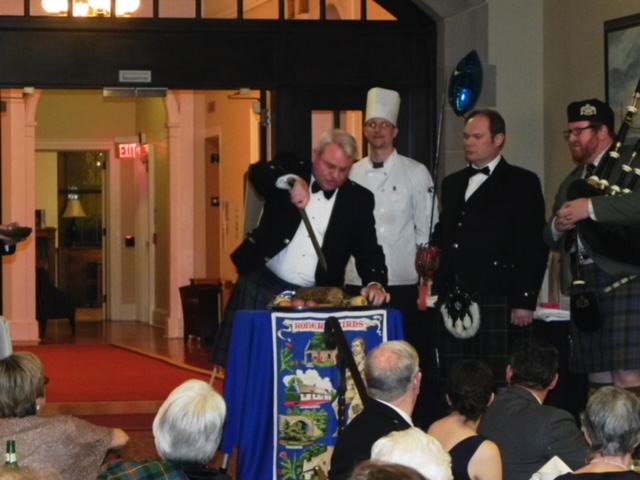
Burns Night celebrations grow 227 years after the Scottish bard’s death
Salena Zito
Video Embed
PITTSBURGH — Wednesday evening, people all across the world, mostly of Scots descent but also plenty who are not, will begin their evenings draped in plaid, addressing the haggis, which is brought out to the sound of bagpipes, and listening to those gathered recite the poetry of Robert Burns.
The evening is topped off with plenty of toasts with Scotch whisky and everyone singing “Auld Lang Syne.”
Dale McLeod, president of the local St. Andrew’s Society, said Burns Nights or Burns Suppers are a celebration of the Scottish poet Robert Burns on the anniversary of his birth. “The first Burns Night supper was held on the fifth anniversary of Burns’s death and was attended by nine of his friends, with all of them gathering in Alloway, his birthplace, to eat haggis, read his works, and raise a toast to their dear departed friend,” he said.
That toast would eventually become known as the “immortal memory.” “Eventually, it was moved to his birthday and initially mostly celebrated in rural Scotland. Today, it is estimated that over 900,000 Burns Nights are celebrated worldwide on or near Jan. 25,” he said.
McLeod said the local celebration hosted by the St. Andrew’s Society has become so popular in recent years that this year, they sold out in days. “We kick it off with the saying of the Selkirk Grace, then the haggis is brought out to the accompaniment of bagpipes and pipe drums, and Burns’s Address to a Haggis is recited,” he explained.
McLeod said the St. Andrew’s Society, a fraternal organization dedicated to celebrating the Scottish influence in our culture, will hold its event this Saturday.
To underscore how worldwide the event is, haggis was transported to the continent of Antarctica on the United Kingdom’s exploration ship RRS Sir David Attenborough for the British Antarctic Survey’s Rothera Research Station workers so that they could mark the event properly.
McLeod said the influence of the Scots in our country could be traced to their early migration to the then-colonies in the early 17th century, which saw these expats migrate from their port of entry in New Hampshire and then head diagonally south through the Appalachian Mountains, settling in towns, cities, and farms along the way, affecting the language, culture, and the building of our local governments in their path.
One needs to look no further for evidence of Scots’ influence in civic engagement than the number of U.S. presidents who are of Scottish descent. Of the 46 presidents, 34 have had Scottish ancestry, including George Washington, both Roosevelts, Barack Obama, Bill Clinton, and Donald Trump, whose mother, Mary Anne MacLeod, was born in Scotland.

The Scots’ embrace of representative government also had a significant influence on the formation of colonial America. When antagonisms were leading to the Revolutionary War, they were often the first to join the continental forces and were recognized for their musketry in the backcountry.
“A lot of people don’t even realize their Scots ancestry,” said McLeod, “because the Scots were quick to assimilate once they landed here. They were ready to settle, prosper, and make a life for themselves and their families.”
In life, Burns was quite the character. Born Jan. 25, 1759, he wrote poetry about what he knew: farming and his love of women — he fathered 12 children by four different ones. His first poem as a teenager was about unrequited love and was called Handsome Nell. He would go on to write over 700 poems in his brief lifetime before dying at age 37.
His struggles as a farmer shone through his poetry. His best-known composition, Auld Lang Syne, has become the world’s New Year’s celebration anthem.
McLeod said it is remarkable to see the growth in popularity of the celebration and not just here in western Pennsylvania. A quick scan of social media showed thousands of people on Twitter posting about how they were celebrating, along with their sentiments about haggis.
“Well, I don’t mind haggis,” he said, laughing at people’s reaction to the Scots delicacy, made of sheep’s heart, liver, and lungs, all cooked in the animal’s stomach. He also laughed at Burns’s tongue-in-cheek ode to the dish in his poem Address to Haggis.
“I think that whatever concerns you may have about the haggis can be cured with whiskey,” he said of the other more popular staple of Burns Night.
CLICK HERE TO READ MORE FROM THE WASHINGTON EXAMINER
